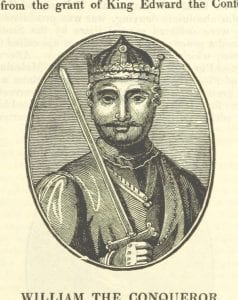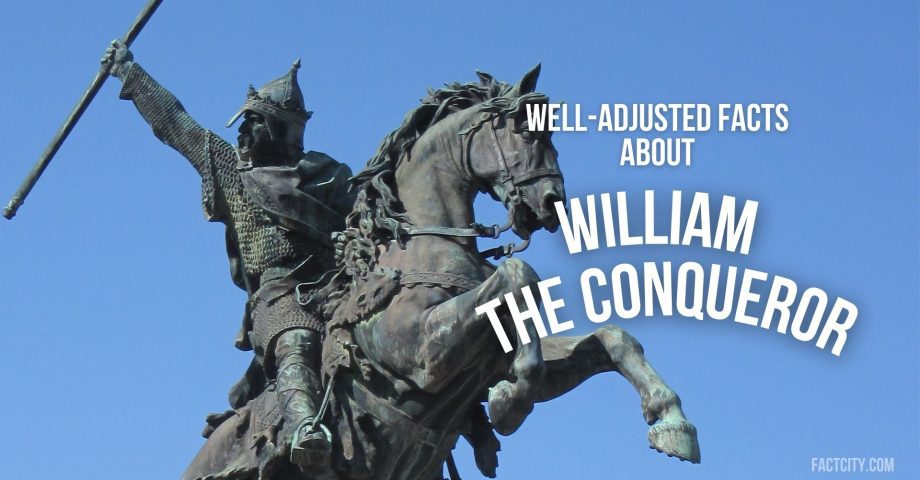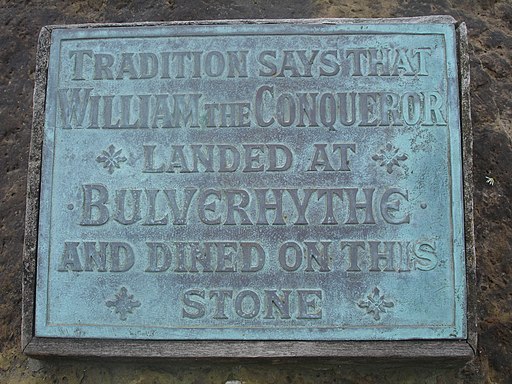14 Well-adjusted Facts about William the Conqueror
William I of England, better known as William the Conqueror or William the Bastard, despite his difficult childhood, became one of the most influential kings in British history. He made himself the mightiest noble in France and by conquering England he altered the course of the country’s history. He was a complicated man, and a ruthless warrior, but he was also a gifted ruler and administrator, and a highly religious man.
Why was he considered one of the greatest soldiers and rulers of the Middle Ages? What were his contributions as a leader? To answer these questions and more read these interesting facts about William the Conqueror…
1. He is the son of Robert I
William was the son of Robert I, Duke of Normandy (reigned 1027–1035), and his mistress Herlava of Falaise. Through his mother, William had two half-brothers: Odo, and Robert, who gave him important support later in his career.
2. His father, Robert, was the Duke of Normandy
Because Robert had no legal heir, he made his nobles acknowledge William as his heir and swear fealty to the boy. He went on a pilgrimage to the Holy Land from which he would never return, leaving Normandy to be rowed over by the remaining Norman elite.
3. William’s battle victory paved his hunger for expansion
William secured his hold on Normandy with victory at the Battle of Varaville in 1057. Eager for more, William started campaigns against other neighboring rulers to expand his territory.
4. The attack on England promoted him
That envisaged expansion included his attack on England in 1066, which culminated with him becoming king of England.
5. His Coronation Day wasn’t all roses
In 1066, on Christmas Day, he was crowned king of England at Westminster Abbey. The nobility and clerics loudly shouted their approval of the king on Coronation Day. William’s Norman guards, surprised by the outburst and believing there was treachery afoot, promptly set fire to surrounding buildings in the city of London. In fact, it’s said that after this day, the London city folk never really trusted the Normans again.
6. Matilda of Flanders’ influence
In the 1050s, William married Matilda of Flanders. Women were treated as inferior beings in the medieval period, and their roles were often limited to childbearing. In this regard, a really surprising fact is that Matilda managed to exert a large amount of power and influence throughout her life. Without her, William of Normandy wouldn’t have been able to conquer England while still maintaining control over Normandy. At times Matilda shared the royal authority with William in order to become more than just his spouse and become his ruling equal.
7. The night of 27–28 September 1066
William’s army crossed the English Channel, just as King Harold marched north to fight an invading force commanded by the king of Norway and Harold’s brother. Even though they’ve killed the king of Norway and Harold’s brother, the English marched south to Hastings, where they were defeated by the Norman army on the 14th of October. William then advanced through Southeast England.
8. The Battle of Hastings or the Battle of Battle?
Despite becoming known as the Battle of Hastings, the battle didn’t take place at Hastings, but on a ridge near a tiny village called Battle, so the Battle of Hastings was the Battle of Battle.
9. To retreat was not an option!
When William and his 700 ships landed on the shores of England, he demanded that the Normans set fire to some of his vessels. This gesture was meant to demonstrate to his troops that retreat was not an option.

Silver coin with William the Conquer Head
10. Praising God
William gave thanks to God for his victory in England and ordered his troops to do penance for the Englishmen they had killed that day. The Bishops of Normandy ordered the troops to contribute food and money to the poor or to build new churches.
11. Self-penance
William himself did penance by paying for the building of Battle Abbey on the battlefield site and what’s even more interesting he rebuilt 9 of the 15 existing cathedrals in England!
12. Noble’s rebellion
Several English nobles rebelled against Norman rule in England, among them the earls Eadwine and Morcar, in the late 1060s. William responded to the rebellion by devastating large areas of the north of the country and also by replacing several English bishops from office with his Normans allies.

13. Where did William spend the majority of his time?
From 1072 onwards William spent the majority of his time in Normandy. In the last months of his reign, in Normandy, William fought a counter-offensive in the French Vexin territory against King Philip’s taking-over of the remote Normandy territory.
14. William left a deep mark on both Normandy and England
William is one of the most important figures of medieval English history. His determination and good fortune allowed him to survive the anarchy of Normandy in his youth, and gradually transform the duchy into the leading political and military power of northern France. Even though he accepted many Anglo-Saxon institutions and continued with different social and economic trends that had begun before 1066, he truly changed the course of English history by conquering England in 1066!
FAQs about William The Conqueror
What language did William the Conqueror speak?
William most certainly spoke French as he hailed from Normandy and invaded England – in fact, English wouldn’t be the official language in the country for at least another three centuries after William’s reign!
How did William the Conqueror die?
William the Conqueror is said to have died due to intestinal rupture while fighting on horseback, which led to a fatal infection.
Where is William I buried?
William the Conqueror was initially buried in Caen, France, in the foundation of St. Stephen. His grave is marked by a slab nowadays, as St. Stephen was desecrated in both the 16th and 18th centuries.
Do you know any interesting facts about William the Conqueror? Share them in the comments below!
This page was last modified on November 28, 2023. Suggest an edit










